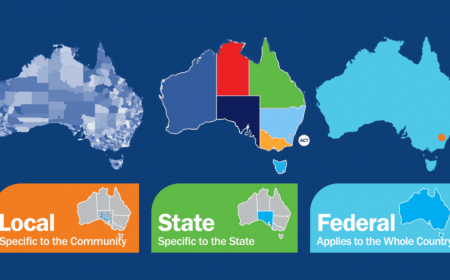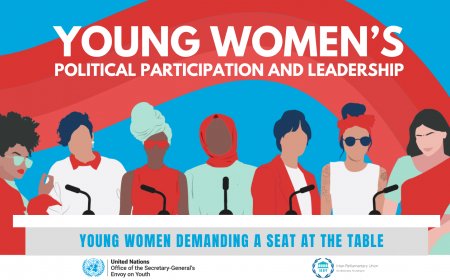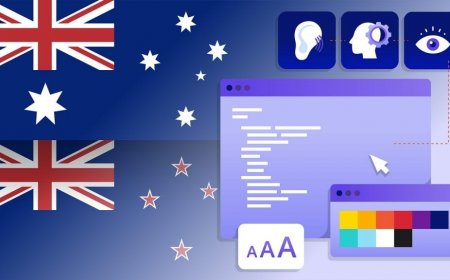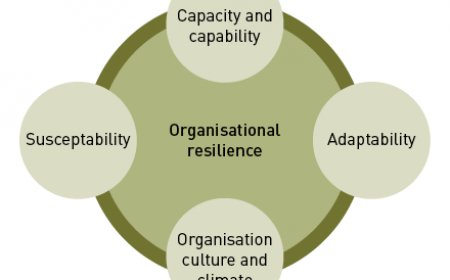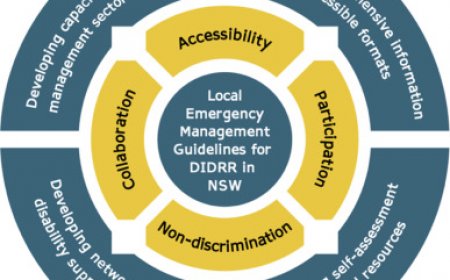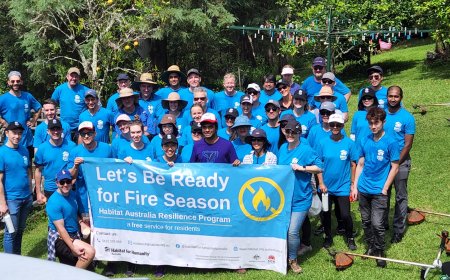Australia Blockchain Technology: Key Developments
Discover the key developments driving blockchain technology in Australia, from innovative use cases to government initiatives and industry adoption. Explore how blockchain is transforming sectors like finance, healthcare, and supply chain management while addressing challenges and fostering accessibility. Stay informed about Australia's growing role in the global blockchain ecosystem and learn how you can get involved in this transformative technology.

Blockchain technology, once a niche concept primarily associated with cryptocurrencies, has rapidly evolved into a transformative force across multiple industries. In Australia , this innovation is gaining significant traction, driven by its potential to enhance transparency, security, and efficiency in various sectors. As governments, businesses, and academic institutions increasingly recognize the value of blockchain, the country is positioning itself as a leader in adopting and advancing this groundbreaking technology.
The appeal of blockchain lies in its decentralized nature, which eliminates the need for intermediaries in transactions and data management. This not only reduces costs but also minimizes the risk of fraud and errors, making it particularly attractive for industries such as finance, supply chain management, healthcare, and government services. In Australia, where trust and accountability are paramount, blockchain offers a compelling solution to many longstanding challenges.
One of the key factors propelling blockchain adoption in Australia is the proactive stance of the Australian government . Recognizing the technology’s potential to drive economic growth and innovation, federal and state authorities have launched several initiatives to support blockchain research, development, and implementation. These efforts include funding programs, regulatory frameworks, and partnerships with private sector players to explore real-world applications. For instance, the National Blockchain Roadmap , unveiled in 2020, outlines a strategic plan to integrate blockchain into critical sectors, fostering collaboration between industry stakeholders and promoting Australia as a global hub for blockchain innovation.
Beyond government initiatives, the private sector has also played a pivotal role in advancing blockchain technology. Australian startups and established enterprises alike are leveraging blockchain to streamline operations, improve customer experiences, and create new business models. From financial institutions exploring decentralized finance (DeFi) solutions to logistics companies implementing blockchain-based tracking systems, the applications are vast and varied. Notable examples include Commonwealth Bank of Australia’s blockchain-powered smart contracts and AgriDigital’s platform for managing agricultural supply chains.
Academic and research institutions further bolster Australia’s blockchain ecosystem by conducting cutting-edge studies and fostering talent development. Universities across the country are offering specialized courses and establishing research centers dedicated to blockchain technology. These initiatives ensure a steady pipeline of skilled professionals equipped to meet the growing demand for blockchain expertise.
As we delve deeper into this article, we will explore the key developments that have shaped Australia’s blockchain landscape, highlighting groundbreaking projects, influential figures, and the challenges and opportunities that lie ahead. By understanding these dynamics, we can appreciate how blockchain is not just a technological advancement but a catalyst for reshaping Australia’s economic and social fabric.
Key Milestones in Blockchain Adoption Across Australian Industries
The journey of blockchain adoption in Australia has been marked by significant milestones that underscore the technology’s versatility and transformative potential. Across various industries, pioneering projects and strategic implementations have demonstrated blockchain’s ability to address complex challenges, enhance operational efficiency, and foster innovation. These milestones not only highlight the progress made but also serve as benchmarks for future advancements in the country’s blockchain ecosystem.
Finance and Banking: Revolutionizing Transactions and Security
The financial sector has been at the forefront of blockchain adoption in Australia, with banks and fintech companies leveraging the technology to streamline processes, reduce costs, and enhance security. One of the most notable milestones was achieved by the Commonwealth Bank of Australia (CBA) , which became the first Australian bank to execute a blockchain-based bond issuance in partnership with the World Bank. In 2018, CBA facilitated the creation and management of a AUD $110 million bond using blockchain technology, marking a world-first in the capital markets space. This project demonstrated how blockchain could simplify the bond issuance process by eliminating intermediaries, reducing settlement times, and ensuring immutable record-keeping.
Another landmark achievement in the financial sector came from Westpac , which collaborated with IBM to develop a blockchain-based platform for managing cross-border payments. The initiative aimed to address inefficiencies in traditional payment systems by providing real-time transaction tracking and reducing reliance on correspondent banking networks. Similarly, ANZ Bank partnered with Scentre Group to implement a blockchain solution for managing property lease agreements, showcasing the technology’s potential to automate contract execution and improve transparency in commercial real estate.
Fintech startups have also contributed significantly to blockchain adoption in finance. Companies like Power Ledger have pioneered blockchain-based platforms for peer-to-peer energy trading, enabling consumers to buy and sell renewable energy directly. While primarily focused on the energy sector, Power Ledger’s success highlights the broader applicability of blockchain in creating decentralized marketplaces and empowering individuals to take control of their financial transactions.
Supply Chain Management: Enhancing Transparency and Traceability
In the realm of supply chain management , blockchain has emerged as a game-changer, offering unparalleled levels of transparency and traceability. Australian industries, particularly agriculture and logistics, have embraced blockchain to address issues related to provenance, quality assurance, and fraud prevention. A standout example is AgriDigital , a Sydney-based startup that developed a blockchain platform for managing grain supply chains. By digitizing transactions and recording them on an immutable ledger, AgriDigital ensures that all stakeholders—from farmers to buyers—have access to accurate, tamper-proof data about the origin and condition of agricultural products.
Another milestone was achieved by Wine Australia , the national body representing the country’s wine industry, which partnered with Everledger to implement a blockchain-based system for verifying the authenticity of Australian wines. This initiative addresses the growing problem of counterfeit wines in international markets, providing consumers with verifiable proof of a bottle’s provenance and quality. The project not only protects the reputation of Australian winemakers but also enhances consumer trust and confidence in premium products.
Logistics giant Linfox has also adopted blockchain to optimize its operations, partnering with IBM to develop a platform for tracking shipments across its extensive network. By integrating IoT devices with blockchain technology, Linfox can monitor the location, temperature, and condition of goods in real time, ensuring compliance with regulatory standards and reducing spoilage rates. This application exemplifies how blockchain can transform supply chain management by providing end-to-end visibility and accountability.
Healthcare: Securing Patient Data and Streamlining Processes
The healthcare sector in Australia has begun to harness blockchain’s capabilities to address critical challenges related to data security, interoperability, and patient privacy. One of the most impactful milestones was achieved by the Australian Digital Health Agency (ADHA) , which explored blockchain as part of its strategy to enhance the My Health Record system. By integrating blockchain, ADHA aims to create a decentralized repository for patient records, enabling secure sharing of information among healthcare providers while maintaining strict access controls.
Another significant development came from Hashed Health , a U.S.-based company that partnered with Australian organizations to pilot blockchain solutions for managing clinical trials. The project focused on improving transparency and accountability in trial data collection, ensuring that results were tamper-proof and auditable. This initiative has far-reaching implications for medical research, as it enhances the credibility of clinical trial outcomes and accelerates the approval process for new treatments.
Telemedicine platforms have also embraced blockchain to safeguard sensitive patient data and facilitate seamless interactions between doctors and patients. For instance, MediBloc , a blockchain-based health information exchange platform, has gained traction in Australia for its ability to empower patients with ownership of their medical records. By storing data on a decentralized ledger, MediBloc ensures that patients can grant or revoke access to their information, fostering greater autonomy and trust in digital healthcare services.
Government Services: Promoting Accountability and Efficiency
The Australian government has been instrumental in driving blockchain adoption, particularly in areas requiring high levels of accountability and efficiency. One of the most notable milestones was the launch of the National Blockchain Roadmap in 2020, a comprehensive strategy aimed at integrating blockchain into key sectors such as agriculture, education, and cybersecurity. The roadmap identified priority use cases, including identity verification, credentialing, and smart contracts, and outlined steps to foster collaboration between public and private stakeholders.
A groundbreaking project in this domain was led by the Department of Home Affairs , which piloted a blockchain-based system for managing trade documentation. Known as the Intelligent Ledger for Trade (IL4T) , the platform enables secure sharing of customs declarations, certificates of origin, and other trade-related documents among government agencies and private entities. By reducing paperwork and minimizing human error, IL4T streamlines cross-border trade processes, enhancing Australia’s competitiveness in the global economy.
State governments have also embraced blockchain to improve service delivery. For example, the Queensland government partnered with Power Ledger to implement a blockchain-based energy trading platform in regional communities. The project allows residents to generate solar power and sell excess electricity to neighbors, promoting sustainability and energy independence. Similarly, the New South Wales government launched a blockchain pilot for managing land registries, aiming to reduce fraud and expedite property transactions.
Education and Credentialing: Verifying Academic Achievements
The education sector has seen significant progress in adopting blockchain for credentialing and verification purposes. Institutions like RMIT University have taken the lead by issuing digital diplomas on a blockchain platform, allowing graduates to share verified copies of their qualifications with employers securely. This initiative not only simplifies the hiring process but also combats the growing issue of diploma fraud.
Another milestone was achieved by OpenCerts , a consortium of Australian universities that developed a blockchain-based framework for issuing and validating academic credentials. By storing certificates on a decentralized ledger, OpenCerts ensures that they cannot be altered or forged, providing students and employers with peace of mind regarding the authenticity of educational achievements.
These milestones collectively illustrate the transformative impact of blockchain technology across Australian industries. From revolutionizing financial transactions to securing patient data and streamlining government services, blockchain continues to demonstrate its versatility and potential to drive innovation. As adoption accelerates, these achievements will serve as a foundation for even more ambitious projects, solidifying Australia’s position as a global leader in blockchain development.
Profiles of Influential Figures Driving Blockchain Innovation in Australia
Dr. Jane Thomason: A Visionary Leader in Blockchain for Social Impact
Dr. Jane Thomason stands as one of the most influential voices in Australia’s blockchain community, renowned for her work in leveraging blockchain technology to drive social impact and sustainable development. As the founder of Blockchain for Social Impact , Dr. Thomason has dedicated her career to exploring how blockchain can address pressing global challenges, such as poverty alleviation, climate change, and equitable access to resources. Her groundbreaking research and advocacy have positioned her as a thought leader both domestically and internationally, earning her recognition from organizations like the United Nations and the World Economic Forum.
Dr. Thomason’s contributions extend beyond academia and policy-making. She has actively collaborated with governments, non-profits, and private sector players to design and implement blockchain-based solutions tailored to marginalized communities. For instance, she spearheaded a project in rural Australia that utilized blockchain to provide indigenous populations with secure access to financial services, empowering them to participate in the digital economy. Her commitment to inclusivity and ethical innovation underscores her belief that blockchain should serve as a tool for empowerment rather than exclusion.
Nick Giurietto: Championing Industry Collaboration and Policy Development
Nick Giurietto has emerged as a pivotal figure in shaping Australia’s blockchain ecosystem through his leadership at the Australian Digital Commerce Association (ADCA) . As the CEO of ADCA, Giurietto has been instrumental in advocating for favorable regulatory frameworks and fostering collaboration between industry stakeholders, government bodies, and academic institutions. Under his guidance, ADCA has become a trusted voice in discussions surrounding blockchain policy, ensuring that Australia remains competitive in the global blockchain landscape.
Giurietto’s influence is evident in his role in drafting the National Blockchain Roadmap , a strategic document that outlines key priorities for blockchain adoption across various sectors. His ability to bridge the gap between technical experts and policymakers has been crucial in demystifying blockchain for decision-makers and promoting its integration into mainstream industries. Beyond policy advocacy, Giurietto frequently participates in international forums, representing Australia’s interests and showcasing the country’s advancements in blockchain technology.
Jemma Green: Pioneering Decentralized Energy Solutions
Jemma Green is a trailblazer in the intersection of blockchain and renewable energy, co-founding Power Ledger , one of Australia’s most successful blockchain startups. As the Executive Chairman of Power Ledger, Green has championed the development of decentralized energy trading platforms that enable consumers to buy, sell, and share renewable energy seamlessly. Her vision of democratizing energy markets aligns with broader goals of sustainability and resilience, addressing critical issues such as energy affordability and environmental conservation.
Green’s leadership has garnered widespread acclaim, with Power Ledger receiving numerous accolades, including the prestigious EY Fintech Australia Award . Her work extends beyond entrepreneurship; she is also a vocal advocate for blockchain education, regularly speaking at conferences and universities to inspire the next generation of innovators. Green’s ability to translate complex technological concepts into actionable solutions has made her a respected figure in both the tech and sustainability communities.
Dr. Mark Staples: Advancing Research and Innovation
Dr. Mark Staples, a senior researcher at CSIRO’s Data61 , has played a foundational role in advancing blockchain research and innovation in Australia. With a background in software engineering and distributed systems, Dr. Staples leads Data61’s blockchain initiatives, focusing on developing scalable and secure blockchain architectures. His team’s work has resulted in several high-impact projects, including the development of Smart Contracts frameworks and tools for auditing blockchain applications.
Dr. Staples’ contributions to the field are complemented by his involvement in international collaborations, such as the Global Blockchain Benchmarking Study , which provides insights into the adoption and performance of blockchain technologies worldwide. His commitment to open-source research ensures that advancements in blockchain are accessible to all, fostering a culture of knowledge-sharing and continuous improvement.
Dr. Vincent Gramoli: Leading Distributed Systems Research
Dr. Vincent Gramoli, a professor at the University of Sydney and head of the Concordium Blockchain Research Center , is a leading authority on distributed systems and consensus algorithms. His groundbreaking research focuses on improving the scalability, security, and energy efficiency of blockchain networks. Dr. Gramoli’s work on Red Belly Blockchain , a high-performance blockchain protocol, has set new benchmarks for transaction speed and reliability, addressing some of the most significant limitations of existing blockchain systems.
Through his academic leadership and entrepreneurial ventures, Dr. Gramoli has bridged the gap between theoretical research and practical applications. He actively collaborates with industry partners to deploy Red Belly Blockchain in real-world scenarios, demonstrating its potential to revolutionize sectors such as finance, supply chain, and healthcare. His dedication to advancing blockchain technology has earned him recognition as one of Australia’s foremost experts in the field.
Emma Poposka: Empowering Financial Inclusion
Emma Poposka, the co-founder and CEO of Brave New Coin , has been a driving force in promoting financial inclusion through blockchain technology. Brave New Coin specializes in providing data analytics and market intelligence for the cryptocurrency and blockchain industries, empowering businesses and investors to make informed decisions. Poposka’s leadership has positioned the company as a trusted source of blockchain insights, contributing to the growth of Australia’s fintech ecosystem.
Poposka’s advocacy for blockchain extends to her efforts in educating regulators and the public about the benefits and risks of decentralized finance (DeFi). She frequently contributes to policy discussions, emphasizing the importance of striking a balance between innovation and consumer protection. Her passion for democratizing access to financial services reflects her belief in blockchain’s potential to create a more equitable economy.
Dr. Clare Payne: Ethical Leadership in Blockchain
Dr. Clare Payne, an ethics specialist and advisor to blockchain projects, has been instrumental in promoting ethical considerations within the blockchain space. As the founder of The Ethics Centre’s Future of Ethics Program , Dr. Payne works closely with organizations to ensure that blockchain implementations align with principles of fairness, transparency, and accountability. Her expertise in ethical governance has been particularly valuable in guiding startups and corporations navigating the complexities of decentralized systems.
Dr. Payne’s influence is amplified by her role as an advisor to several blockchain initiatives, including those focused on identity management and data privacy. She emphasizes the importance of embedding ethical frameworks into blockchain design, ensuring that the technology serves humanity’s best interests. Her thought leadership has sparked critical conversations about the societal implications of blockchain, encouraging responsible innovation.
Samuel Brooks: Bridging Blockchain and Cybersecurity
Samuel Brooks, a cybersecurity expert and blockchain consultant, has carved out a niche in addressing the unique security challenges posed by blockchain technology. As the founder of Cyberfort Consulting , Brooks advises businesses and government agencies on mitigating risks associated with blockchain adoption, such as smart contract vulnerabilities and data breaches. His hands-on approach combines technical expertise with strategic foresight, enabling clients to harness blockchain’s benefits while safeguarding against potential threats.
Brooks’ contributions to the field are underscored by his involvement in developing best practices for blockchain security. He frequently collaborates with industry bodies and academic institutions to advance research and training programs, equipping professionals with the skills needed to navigate the evolving threat landscape. His dedication to cybersecurity ensures that blockchain remains a trusted and resilient technology.
Dr. Lisa Cameron: Advocating Blockchain in Government
Dr. Lisa Cameron, a former politician and now a prominent advocate for blockchain in government services, has been instrumental in promoting the adoption of blockchain within public sector operations. As the founder of EdenBlock , a consultancy firm specializing in blockchain solutions, Dr. Cameron works closely with government agencies to design and implement blockchain-based systems for identity verification, voting, and public procurement. Her expertise in policy-making and technology integration has made her a sought-after advisor in discussions about digital transformation.
Dr. Cameron’s advocacy extends to her efforts in raising awareness about blockchain’s potential to enhance transparency and accountability in governance. She frequently engages with policymakers and stakeholders to highlight successful case studies and encourage investment in blockchain infrastructure. Her vision of a blockchain-enabled government underscores her commitment to building trust and efficiency in public services.
Professor Paul Haskell-Dowland: Educating the Next Generation
Professor Paul Haskell-Dowland, the Associate Dean of Computing and Security at Edith Cowan University , has been a champion of blockchain education in Australia. Through his leadership, the university has introduced specialized courses and research programs focused on blockchain technology, equipping students with the skills needed to excel in this rapidly evolving field. Professor Haskell-Dowland’s emphasis on practical learning ensures that graduates are prepared to tackle real-world challenges in blockchain development and implementation.
Beyond academia, Professor Haskell-Dowland actively collaborates with industry partners to identify emerging trends and skill gaps in the blockchain workforce. His efforts to align education with industry needs have strengthened Australia’s talent pipeline, ensuring that the country remains at the forefront of blockchain innovation. His dedication to education reflects his belief in nurturing the next generation of blockchain leaders.
These influential figures collectively represent the diverse facets of blockchain innovation in Australia, from research and entrepreneurship to policy-making and education. Their contributions have not only advanced the technology itself but also created a supportive ecosystem that fosters collaboration, inclusivity, and ethical innovation. As blockchain continues to evolve, their leadership will remain instrumental in shaping its trajectory and unlocking its full potential.
Strategic Initiatives by the Australian Government to Advance Blockchain Technology
The Australian government has recognized the transformative potential of blockchain technology and has taken deliberate steps to position the nation as a global leader in its adoption and development. Through a combination of policy frameworks, funding programs, and collaborative initiatives, the government has laid a robust foundation for blockchain innovation. These efforts not only aim to enhance the efficiency and transparency of public services but also to stimulate economic growth, foster industry collaboration, and address regulatory challenges.
National Blockchain Roadmap: A Strategic Blueprint for Growth
One of the most significant milestones in Australia’s blockchain journey is the introduction of the National Blockchain Roadmap in February 2020. Developed by the Department of Industry, Science, Energy, and Resources, the roadmap serves as a comprehensive guide to integrating blockchain technology across various sectors. It identifies three initial focus areas—supply chain management , credentialing , and regulatory technology (RegTech) —while outlining actionable steps to scale blockchain adoption over the next decade.
The roadmap emphasizes the importance of collaboration between government agencies, private enterprises, and academic institutions to unlock blockchain’s potential. For instance, it proposes the establishment of a Blockchain Knowledge Exchange , a centralized platform for sharing insights, best practices, and lessons learned from pilot projects. This initiative seeks to break down silos and accelerate the dissemination of knowledge, ensuring that stakeholders can build on each other’s successes.
Additionally, the roadmap highlights the need for regulatory clarity to support blockchain innovation. By engaging with industry leaders and legal experts, the government aims to create a balanced framework that encourages experimentation while safeguarding consumer interests. This forward-thinking approach underscores Australia’s commitment to fostering a conducive environment for blockchain development.
Blockchain Pilots and Proof-of-Concept Projects
To demonstrate the practical applications of blockchain, the Australian government has invested in numerous pilot projects and proof-of-concept (PoC) initiatives. These projects span a wide range of industries, from agriculture to finance, and are designed to test the feasibility and scalability of blockchain solutions in real-world scenarios.
A standout example is the Intelligent Ledger for Trade (IL4T) , a blockchain-based platform developed by the Department of Home Affairs in collaboration with IBM. IL4T streamlines cross-border trade processes by enabling secure and transparent sharing of customs documentation, certificates of origin, and other trade-related records. By reducing paperwork and manual verification, the platform minimizes delays and errors, enhancing the efficiency of Australia’s trade operations. The success of IL4T has paved the way for broader adoption of blockchain in international commerce, positioning Australia as a leader in digital trade innovation.
Another notable initiative is the Smart Money Project , led by the Data Standards Body (DSB) under the Consumer Data Right (CDR) framework. This project explores the use of blockchain to create programmable money, or “smart money,” that can be automatically disbursed based on predefined conditions. For example, welfare payments could be programmed to ensure funds are spent on essential items such as food or housing. By automating compliance and reducing administrative overhead, smart money has the potential to revolutionize how governments deliver financial assistance to citizens.
Funding and Grants to Support Blockchain Innovation
Recognizing the need for financial backing to drive blockchain innovation, the Australian government has allocated substantial funding to support research, development, and commercialization efforts. Programs like the Industry Growth Centres Initiative and the Cooperative Research Centres (CRC) Program provide grants to organizations working on cutting-edge blockchain solutions.
For instance, the Blockchain Innovation Hub , established at RMIT University with government support, conducts interdisciplinary research on blockchain applications in areas such as law, economics, and cybersecurity. The hub’s findings inform policy decisions and help shape the future direction of blockchain adoption in Australia. Similarly, the Digital Transformation Agency (DTA) has funded several blockchain pilots aimed at improving public service delivery, including projects related to identity management and digital voting.
The government has also encouraged private sector participation through co-investment models. By partnering with venture capital firms and corporate sponsors, it amplifies the impact of its funding initiatives, ensuring that promising startups receive the resources they need to scale their operations. This collaborative approach fosters a vibrant ecosystem where innovation thrives.
Regulatory Frameworks and International Collaboration
Developing a clear and consistent regulatory framework is critical to sustaining blockchain growth. To this end, the Australian government has engaged in extensive consultations with industry stakeholders to draft policies that balance innovation with accountability. The Australian Securities and Investments Commission (ASIC) and the Australian Taxation Office (ATO) have issued guidelines on the classification and taxation of cryptocurrencies and blockchain-based assets, providing much-needed clarity for businesses and investors.
Moreover, Australia actively participates in international forums to harmonize blockchain regulations and promote global standards. The government collaborates with organizations such as the International Organization for Standardization (ISO) and the World Economic Forum (WEF) to contribute to the development of blockchain protocols and governance models. This involvement ensures that Australia remains aligned with global best practices while also influencing the direction of international blockchain policy. By participating in these forums, Australia not only gains insights into emerging trends and regulatory approaches but also positions itself as a thought leader in the global blockchain community.
One significant example of this international collaboration is Australia’s engagement with the Global Blockchain Business Council (GBBC) , where it contributes to discussions on fostering cross-border blockchain adoption and addressing challenges such as interoperability and data privacy. These efforts are particularly important given the decentralized nature of blockchain technology, which often transcends national boundaries and requires coordinated regulatory responses.
Additionally, the Australian government has signed bilateral agreements with countries like Singapore and Estonia—both recognized leaders in digital innovation—to explore joint blockchain initiatives. For instance, the Australia-Singapore Digital Economy Agreement includes provisions for testing blockchain solutions in areas such as supply chain transparency and digital identity verification. Such partnerships enable Australia to leverage the expertise of other nations while simultaneously showcasing its own advancements in blockchain technology.
Promoting Education and Workforce Development
Recognizing that widespread blockchain adoption hinges on having a skilled workforce, the Australian government has prioritized education and training programs to equip individuals with the necessary technical and analytical skills. Initiatives like the National Skills Commission have identified blockchain-related competencies as critical for future job markets, prompting universities and vocational institutions to incorporate blockchain courses into their curricula.
The government has also funded specialized research centers, such as the Concordium Blockchain Research Center at the University of Sydney, which focuses on advancing knowledge in distributed ledger technologies. These centers serve as hubs for cutting-edge research and industry collaboration, ensuring that academic advancements translate into practical applications. Furthermore, programs like the Digital Skills Cadetship Trial offer hands-on learning opportunities for students and professionals to gain real-world experience in blockchain development and implementation.
To address the immediate demand for blockchain expertise, the government supports upskilling initiatives through partnerships with private sector players and industry bodies. For example, the Australian Digital Commerce Association (ADCA) runs certification programs that provide participants with credentials recognized by employers across various sectors. By investing in education and workforce development, the government ensures that Australia has a steady pipeline of talent capable of driving blockchain innovation forward.
Encouraging Public-Private Partnerships
Public-private partnerships (PPPs) have been a cornerstone of the Australian government’s strategy to accelerate blockchain adoption. By fostering collaboration between government agencies, private enterprises, and research institutions, PPPs facilitate the co-creation of innovative solutions tailored to specific industry needs. These partnerships also help distribute risks and costs associated with large-scale blockchain projects, making them more feasible and sustainable.
A prime example of a successful PPP is the Smart Trade Logistics Initiative , a joint effort between the Department of Industry, Science, Energy, and Resources and several logistics companies. The initiative leverages blockchain to enhance supply chain visibility and efficiency, benefiting both businesses and consumers. Another notable collaboration is the Queensland Blockchain Strategy , which brings together state authorities, startups, and multinational corporations to pilot blockchain applications in energy trading, healthcare, and land registry management.
These partnerships extend beyond domestic borders, with the government actively encouraging foreign investment in Australia’s blockchain ecosystem. By creating an attractive environment for international tech firms and investors, the government amplifies the impact of its initiatives and fosters a globally competitive blockchain industry.
Addressing Ethical and Social Considerations
While promoting technological advancement, the Australian government acknowledges the ethical and social implications of blockchain adoption. To ensure responsible innovation, it has established frameworks that prioritize fairness, inclusivity, and sustainability. For example, the Ethics Framework for Artificial Intelligence and Emerging Technologies , developed by the Department of Industry, Science, Energy, and Resources, includes guidelines for using blockchain in ways that respect human rights and promote equitable outcomes.
The government also encourages transparency and accountability in blockchain projects by mandating rigorous impact assessments and stakeholder consultations. This approach helps mitigate potential risks, such as data misuse or exclusionary practices, ensuring that blockchain serves the broader public interest. Additionally, initiatives like the Blockchain for Social Impact Incubator support projects that address societal challenges, from reducing carbon emissions to improving access to financial services for underserved communities.
By embedding ethical considerations into its blockchain strategy, the Australian government reinforces trust in the technology and ensures that its benefits are shared equitably among all segments of society.
Conclusion: Building a Resilient Blockchain Ecosystem
Through strategic investments, regulatory clarity, international collaboration, and a focus on education and ethics, the Australian government has laid a solid foundation for blockchain innovation. Its proactive stance not only addresses current challenges but also anticipates future opportunities, positioning Australia as a hub for cutting-edge blockchain solutions. As the technology continues to evolve, these initiatives will play a pivotal role in shaping a resilient and inclusive blockchain ecosystem that drives economic growth and improves quality of life for Australians.
Impact of Blockchain Technology on Key Sectors in Australia
Finance and Banking: Revolutionizing Transactions and Security
The integration of blockchain technology into Australia's financial and banking sectors has been transformative, offering unparalleled levels of security, transparency, and efficiency. One of the most visible impacts has been the modernization of payment systems, where blockchain enables faster, cheaper, and more secure transactions compared to traditional methods. For instance, blockchain-based platforms allow for near-instantaneous cross-border payments, significantly reducing the time and cost associated with international money transfers. This shift not only benefits consumers but also enhances the competitiveness of Australian financial institutions on the global stage.
Moreover, blockchain's ability to create immutable records has revolutionized fraud prevention and compliance within the banking sector. Financial institutions can now track every transaction in real-time, making it nearly impossible for fraudulent activities to go unnoticed. This heightened level of scrutiny has led to increased consumer confidence, as customers know their funds are protected against unauthorized access and manipulation. Additionally, smart contracts—self-executing contracts with the terms directly written into code—are being used to automate complex financial processes, such as loan approvals and insurance claims, thereby minimizing human error and operational inefficiencies.
The rise of decentralized finance (DeFi) platforms further underscores blockchain's impact on the financial landscape. These platforms eliminate intermediaries, allowing users to engage in peer-to-peer lending, borrowing, and trading without relying on traditional banks. Startups like Power Ledger and Havven have pioneered DeFi solutions in Australia, empowering individuals to take control of their finances and participate in a truly decentralized economy. As DeFi continues to gain traction, it promises to democratize access to financial services, particularly for underserved populations who may lack access to conventional banking infrastructure.
Supply Chain Management: Enhancing Transparency and Traceability
In the realm of supply chain management , blockchain has emerged as a powerful tool for enhancing transparency and traceability, two critical factors in maintaining consumer trust and optimizing operations. Australian industries, particularly agriculture and logistics, have embraced blockchain to combat issues related to provenance, counterfeiting, and inefficiency. A prime example is AgriDigital , a blockchain platform that digitizes grain supply chains, enabling farmers, buyers, and financiers to interact seamlessly on a single, secure network. By recording every transaction on an immutable ledger, AgriDigital ensures that all stakeholders have access to accurate, tamper-proof data about the origin, quality, and condition of agricultural products.
Another impactful application is in the wine industry, where Wine Australia partnered with Everledger to implement a blockchain-based system for verifying the authenticity of Australian wines. This initiative addresses the pervasive problem of counterfeit wines in international markets, providing consumers with verifiable proof of a bottle's provenance and quality. The result is a significant boost in brand reputation and customer loyalty, as buyers can confidently purchase premium Australian wines knowing they are genuine.
Logistics companies have also harnessed blockchain to streamline operations and improve supply chain resilience. For example, Linfox , one of Australia's largest logistics providers, integrated blockchain with IoT devices to monitor shipments in real-time. This combination allows the company to track the location, temperature, and condition of goods throughout the supply chain, ensuring compliance with regulatory standards and reducing spoilage rates. Such innovations not only enhance operational efficiency but also contribute to sustainability goals by minimizing waste and optimizing resource utilization.
Healthcare: Securing Patient Data and Streamlining Processes
The adoption of blockchain in healthcare has addressed longstanding challenges related to data security, interoperability, and patient privacy. In a sector where sensitive information is routinely exchanged between multiple parties, blockchain provides a secure and transparent framework for managing health records. The Australian Digital Health Agency (ADHA) has explored blockchain as part of its strategy to enhance the My Health Record system, aiming to create a decentralized repository for patient records. By storing data on a blockchain, ADHA ensures that patients retain ownership of their information and can grant or revoke access to healthcare providers as needed, fostering greater autonomy and trust.
Blockchain has also streamlined clinical trials and medical research, areas traditionally plagued by inefficiencies and lack of transparency. Projects like Hashed Health have demonstrated how blockchain can be used to record and verify trial data, ensuring that results are tamper-proof and auditable. This capability accelerates the approval process for new treatments and enhances the credibility of research findings, ultimately benefiting patients and advancing medical science.
Telemedicine platforms have similarly benefited from blockchain integration, with companies like MediBloc offering secure, decentralized solutions for managing patient data. By leveraging blockchain, these platforms enable seamless interactions between doctors and patients while safeguarding sensitive information against breaches. As telehealth continues to grow in popularity, especially in remote and rural areas, blockchain ensures that healthcare delivery remains safe, reliable, and accessible to all Australians.
Government Services: Promoting Accountability and Efficiency
The use of blockchain in government services has ushered in a new era of accountability, transparency, and operational efficiency. From identity verification to land registries, blockchain offers innovative solutions to age-old problems, enhancing public trust and reducing administrative burdens. A landmark project in this domain is the Intelligent Ledger for Trade (IL4T) , developed by the Department of Home Affairs in collaboration with IBM. IL4T simplifies cross-border trade processes by enabling secure sharing of customs documentation, certificates of origin, and other trade-related records among government agencies and private entities. This initiative has reduced paperwork, minimized delays, and improved compliance, bolstering Australia's position as a leader in digital trade.
State governments have also embraced blockchain to improve service delivery. For instance, the Queensland government implemented a blockchain-based energy trading platform in partnership with Power Ledger , allowing residents to generate solar power and sell excess electricity to neighbors. This project promotes renewable energy adoption and empowers communities to achieve energy independence. Similarly, the New South Wales government launched a blockchain pilot for managing land registries, aiming to reduce fraud and expedite property transactions. These applications highlight blockchain's versatility in addressing diverse governance challenges while delivering tangible benefits to citizens.
Education and Credentialing: Verifying Academic Achievements
In the field of education , blockchain has transformed how academic credentials are issued, verified, and managed, addressing issues of diploma fraud and credential misrepresentation. Institutions like RMIT University have adopted blockchain to issue digital diplomas, enabling graduates to share verified copies of their qualifications with employers securely. This innovation simplifies the hiring process, as recruiters no longer need to manually verify transcripts or worry about forged documents.
On a larger scale, the OpenCerts consortium, comprising several Australian universities, has developed a blockchain-based framework for issuing and validating academic credentials. By storing certificates on a decentralized ledger, OpenCerts ensures that they cannot be altered or forged, providing students and employers with peace of mind regarding the authenticity of educational achievements. This initiative not only enhances the credibility of Australian qualifications but also aligns with global trends toward digital credentialing, preparing graduates for success in an increasingly interconnected world.
Energy Sector: Enabling Decentralized Solutions
The energy sector has seen significant disruption thanks to blockchain, particularly in the area of decentralized energy trading. Companies like Power Ledger have introduced platforms that allow consumers to buy and sell renewable energy directly, bypassing traditional utility providers. This peer-to-peer model promotes sustainability by incentivizing the production and consumption of clean energy, while also reducing reliance on centralized grids. Pilot projects in regional communities have demonstrated the feasibility of blockchain-enabled microgrids, paving the way for broader adoption across Australia.
Furthermore, blockchain facilitates better integration of renewable energy sources into existing grids by providing real-time data on energy generation and consumption. This capability enhances grid stability and optimizes resource allocation, contributing to Australia's ambitious renewable energy targets. As the country transitions toward a low-carbon economy, blockchain will undoubtedly play a crucial role in shaping the future of energy distribution and management.
Conclusion: Transformative Potential Across Industries
The impact of blockchain technology on key sectors in Australia underscores its transformative potential to drive innovation, improve efficiency, and foster trust. Whether revolutionizing financial transactions, securing patient data, or streamlining government services, blockchain continues to demonstrate its versatility and value. As adoption accelerates, these advancements will serve as a foundation for even more ambitious projects, solidifying Australia's position as a global leader in blockchain development and application.
Challenges Facing Blockchain Adoption in Australia
Despite the promising advancements and widespread enthusiasm surrounding blockchain technology in Australia, several significant challenges hinder its full-scale adoption. These obstacles span technical, regulatory, cultural, and economic dimensions, each requiring careful consideration and strategic solutions to ensure the sustainable growth of blockchain ecosystems across the nation.
Scalability and Technical Limitations
One of the most pressing challenges facing blockchain adoption in Australia is the issue of scalability . While blockchain offers numerous advantages, such as decentralization and immutability, many existing platforms struggle to handle large volumes of transactions efficiently. For instance, popular blockchain networks like Bitcoin and Ethereum face limitations in terms of transaction speed and throughput, which can lead to bottlenecks during periods of high demand. This scalability issue poses a significant barrier for industries like finance and supply chain management, where rapid processing of transactions is critical.
Efforts to address these technical constraints have led to the development of alternative consensus mechanisms, such as Proof of Stake (PoS) and sharding , which aim to improve transaction speeds and reduce energy consumption. However, transitioning to these newer models often requires substantial investment in infrastructure and expertise, which may not be feasible for smaller organizations or startups. Additionally, integrating blockchain solutions with legacy systems presents another layer of complexity, as many businesses operate on outdated software architectures that are incompatible with blockchain protocols.
Regulatory Uncertainty and Compliance Hurdles
Another major challenge is the lack of clear and consistent regulatory frameworks governing blockchain and cryptocurrency activities. While the Australian government has made strides in developing policies, such as guidelines issued by the Australian Securities and Investments Commission (ASIC) and the Australian Taxation Office (ATO) , ambiguities remain regarding the classification and taxation of blockchain-based assets. This regulatory uncertainty creates hesitancy among businesses and investors, who fear potential legal repercussions or unforeseen liabilities.
For example, companies exploring initial coin offerings (ICOs) or security token offerings (STOs) must navigate a complex web of regulations to ensure compliance with securities laws, anti-money laundering (AML) requirements, and consumer protection standards. The absence of standardized global regulations further complicates matters, as blockchain inherently operates across borders, making it difficult to harmonize legal obligations across jurisdictions. Without a unified approach, businesses risk encountering conflicting rules that stifle innovation and increase operational costs.
Cultural Resistance and Lack of Awareness
Cultural resistance and a general lack of awareness about blockchain technology also impede its adoption in Australia. Many individuals and organizations remain skeptical of blockchain due to misconceptions fueled by media coverage of volatile cryptocurrencies and high-profile scams. This skepticism is compounded by a limited understanding of blockchain’s broader applications beyond finance, leading to hesitation in embracing the technology.
Educational gaps exacerbate this challenge, as there is a shortage of skilled professionals with expertise in blockchain development and implementation. Universities and vocational institutions are gradually incorporating blockchain courses into their curricula, but the pace of education has yet to match the rapid evolution of the technology. As a result, businesses often struggle to find qualified talent to lead blockchain initiatives, slowing down progress and increasing reliance on external consultants or offshore teams.
Moreover, entrenched cultural norms and resistance to change within traditional industries pose additional hurdles. For instance, sectors like banking and logistics, which have long relied on centralized systems, may view blockchain as a disruptive force rather than an opportunity for enhancement. Overcoming this resistance requires targeted outreach and education campaigns to demonstrate blockchain’s tangible benefits and dispel myths about its risks.
High Costs and Resource Constraints
The financial burden associated with implementing blockchain solutions represents another significant barrier, particularly for small and medium-sized enterprises (SMEs). Developing and deploying blockchain platforms often involves substantial upfront costs, including expenses related to software development, hardware infrastructure, cybersecurity measures, and ongoing maintenance. These costs can be prohibitive for organizations with limited budgets, forcing them to delay or abandon blockchain projects altogether.
Even when funding is available, resource constraints such as insufficient IT staff or inadequate technical capabilities can hinder successful implementation. For example, SMEs may lack the internal expertise needed to design, test, and optimize blockchain applications, leaving them dependent on third-party vendors who may not fully understand their unique requirements. This dependency introduces additional risks, such as vendor lock-in or suboptimal performance, further complicating the adoption process.
Interoperability and Standardization Issues
The lack of interoperability between different blockchain platforms and protocols presents another obstacle to widespread adoption. With numerous blockchain networks operating independently, transferring data or assets between systems can be cumbersome and inefficient. This fragmentation undermines the core principle of decentralization, as users are forced to navigate multiple platforms to achieve desired outcomes.
Standardization efforts, such as those led by the International Organization for Standardization (ISO) , aim to establish common frameworks and guidelines for blockchain development. However, achieving consensus among stakeholders remains a slow and contentious process, given the diversity of use cases and competing interests. Until universal standards are established, businesses face challenges in selecting compatible technologies and ensuring seamless integration with existing systems.
Environmental Concerns and Energy Consumption
Finally, environmental concerns related to blockchain’s energy consumption have sparked debates about its sustainability. Traditional blockchain networks, particularly those using Proof of Work (PoW) consensus mechanisms, require vast amounts of computational power, contributing to significant carbon emissions. This environmental impact has drawn criticism from climate advocates and policymakers, who argue that blockchain contradicts Australia’s commitment to reducing greenhouse gas emissions.
Although alternative consensus models like PoS and Proof of Authority (PoA) offer more energy-efficient solutions, transitioning to these models requires overcoming technical and economic barriers. Additionally, educating stakeholders about sustainable blockchain practices and promoting eco-friendly innovations will be essential to mitigating environmental risks and ensuring the technology aligns with broader sustainability goals.
Conclusion: Navigating the Path Forward
While blockchain technology holds immense promise for transforming industries and enhancing societal outcomes, addressing these challenges is crucial for realizing its full potential in Australia. By tackling issues related to scalability, regulation, cultural resistance, cost, interoperability, and sustainability, stakeholders can create a conducive environment for blockchain innovation. Collaborative efforts involving government agencies, private enterprises, academic institutions, and civil society will be instrumental in overcoming these barriers and paving the way for a robust and inclusive blockchain ecosystem.
Accessibility in Blockchain Technology: Bridging Gaps in Australia
As blockchain technology continues to permeate various sectors in Australia, ensuring its accessibility remains a critical priority. Accessibility in this context encompasses not only the technical usability of blockchain platforms but also their inclusivity, affordability, and adaptability to diverse user needs. By addressing accessibility challenges, stakeholders can democratize access to blockchain solutions, enabling individuals and organizations of all sizes and backgrounds to benefit from this transformative technology.
User-Friendly Interfaces and Simplified Onboarding
One of the primary barriers to blockchain adoption is its perceived complexity, which can deter non-technical users from engaging with the technology. To overcome this hurdle, developers are increasingly focusing on creating user-friendly interfaces and streamlined onboarding processes. Modern blockchain platforms now feature intuitive dashboards, drag-and-drop functionalities, and guided tutorials that simplify navigation and reduce the learning curve for newcomers. For example, tools like MetaMask and Coinbase Wallet provide accessible entry points for individuals seeking to manage cryptocurrencies or interact with decentralized applications (dApps).
In addition to improving interface design, efforts are underway to develop no-code or low-code solutions that empower users to build and deploy blockchain applications without extensive programming knowledge. Platforms like Flow and Algorand offer modular templates and pre-built components, enabling businesses to customize blockchain solutions according to their specific needs. These innovations lower the technical threshold for participation, making blockchain accessible to a wider audience, including small businesses and community organizations.
Affordable Access Through Cloud-Based Solutions
The high costs associated with implementing blockchain infrastructure have historically limited its accessibility, particularly for SMEs and startups. To address this issue, cloud-based blockchain services have emerged as a cost-effective alternative, allowing organizations to leverage the technology without significant upfront investments. Providers like Amazon Web Services (AWS) , Microsoft Azure , and IBM Blockchain Platform offer scalable, pay-as-you-go models that cater to varying budget constraints. These platforms provide ready-to-use blockchain frameworks, eliminating the need for organizations to build and maintain their own nodes or servers.
Cloud-based solutions also enhance accessibility by enabling remote deployment and management of blockchain networks. This flexibility is particularly beneficial for regional and rural businesses in Australia, which may lack access to advanced IT resources. By hosting blockchain applications on the cloud, these organizations can participate in global supply chains, decentralized finance ecosystems, and other blockchain-driven initiatives without geographical limitations.
Inclusive Design for Diverse Audiences
Ensuring that blockchain technology is inclusive requires designing solutions that accommodate the needs of underrepresented and marginalized groups. This includes addressing barriers faced by individuals with disabilities, Indigenous communities, and those with limited digital literacy. For instance, blockchain platforms can incorporate features like voice commands , screen readers , and alternative input methods to make them accessible to users with physical or cognitive impairments. Similarly, multilingual support and culturally relevant content can help bridge language and cultural gaps, fostering greater engagement among Australia’s multicultural population.
Projects aimed at promoting financial inclusion exemplify the importance of inclusive design. For example, blockchain-based microlending platforms enable individuals in underserved regions to access credit without relying on traditional banking systems. These platforms often integrate mobile-friendly interfaces and offline capabilities, ensuring that users with limited internet connectivity can still participate. By prioritizing inclusivity, blockchain developers can create solutions that empower all Australians, regardless of socioeconomic status or geographic location.
Decentralized Identity Solutions for Enhanced Privacy
A key aspect of blockchain accessibility is the ability to protect user privacy while facilitating secure interactions. Decentralized identity (DID) solutions, powered by blockchain, offer a revolutionary approach to managing personal data. Unlike centralized systems, where user information is stored in vulnerable databases, DID allows individuals to control their own identities through cryptographic keys. This ensures that sensitive data remains private and tamper-proof, reducing the risk of identity theft and unauthorized access.
In Australia, decentralized identity solutions are gaining traction in sectors like healthcare and government services. For instance, blockchain-based identity management systems enable patients to share verified health records with healthcare providers without compromising confidentiality. Similarly, government agencies can use DID to streamline processes such as welfare disbursement and voter registration, ensuring that citizens’ personal information is safeguarded against misuse. By enhancing privacy and security, these solutions make blockchain more appealing to privacy-conscious users.
Community Engagement and Education Initiatives
Promoting accessibility also involves fostering awareness and understanding of blockchain technology through community engagement and education. Governments, industry bodies, and academic institutions play a pivotal role in organizing workshops, hackathons, and public seminars to demystify blockchain and showcase its practical applications. For example, the Australian Digital Commerce Association (ADCA) regularly hosts events that bring together blockchain enthusiasts, developers, and policymakers to exchange ideas and collaborate on innovative projects.
Educational programs tailored to different audiences further enhance accessibility by equipping individuals with the skills needed to navigate blockchain ecosystems. Universities across Australia have introduced specialized courses and certifications in blockchain technology, catering to students, professionals, and lifelong learners. Additionally, online platforms like Coursera and edX offer free or affordable blockchain courses, enabling anyone with an internet connection to acquire foundational knowledge.
Community-driven initiatives, such as blockchain incubators and innovation hubs, provide valuable resources and mentorship to aspiring entrepreneurs and developers. These programs not only nurture talent but also encourage diversity within the blockchain space, ensuring that underrepresented voices are heard and supported.
Addressing Environmental Concerns for Sustainable Adoption
As environmental sustainability becomes a growing concern, ensuring that blockchain technology is environmentally friendly is essential for maintaining public trust and accessibility. Developers are increasingly adopting energy-efficient consensus mechanisms, such as Proof of Stake (PoS) and Proof of Authority (PoA) , which consume significantly less energy than traditional Proof of Work (PoW) systems. Projects like Ethereum 2.0 and Cardano exemplify this shift toward greener blockchain solutions, demonstrating that technological innovation can coexist with ecological responsibility.
Public awareness campaigns highlighting sustainable blockchain practices can further enhance accessibility by aligning the technology with broader societal values. For instance, showcasing how blockchain supports renewable energy trading or carbon credit tracking can position it as a tool for positive environmental impact. By addressing sustainability concerns, stakeholders can attract environmentally conscious users and reinforce blockchain’s relevance in addressing global challenges.
Conclusion: Building an Accessible Future
By prioritizing accessibility, blockchain technology can fulfill its potential as a transformative force that benefits all Australians. Through user-friendly designs, affordable cloud-based solutions, inclusive practices, enhanced privacy protections, and community engagement, stakeholders can break down barriers and create a more equitable blockchain ecosystem. As accessibility continues to evolve, it will remain a cornerstone of efforts to integrate blockchain into everyday life, ensuring that the technology serves as a catalyst for innovation, empowerment, and social progress.
How to Get Involved in Blockchain Technology in Australia
For individuals and organizations eager to dive into the rapidly evolving world of blockchain technology , Australia offers a wealth of opportunities to learn, innovate, and contribute. Engaging with blockchain can open doors to exciting career prospects, entrepreneurial ventures, and collaborative projects that drive meaningful change across industries. Below, we outline actionable steps and resources to help you get started, whether you’re a beginner or an experienced professional looking to deepen your involvement.
Join Blockchain Communities and Networks
One of the best ways to immerse yourself in blockchain technology is by joining communities and networks dedicated to fostering collaboration and knowledge-sharing. These groups provide invaluable opportunities to connect with like-minded enthusiasts, industry experts, and potential collaborators. In Australia, organizations such as the Australian Digital Commerce Association (ADCA) and Blockchain Australia serve as hubs for networking, advocacy, and education. They host regular events, webinars, and conferences that cover a wide range of topics, from technical developments to regulatory updates.
Local meetups and hackathons are another excellent avenue for engagement. Platforms like Meetup.com and Eventbrite list blockchain-focused gatherings in cities like Sydney, Melbourne, and Brisbane, where participants can brainstorm ideas, build prototypes, and receive feedback from peers. These events often attract sponsors and mentors who can provide guidance and support for your blockchain journey.
Online communities also play a vital role in connecting blockchain enthusiasts across Australia. Forums like Reddit’s r/BlockchainAU , LinkedIn groups , and Discord channels dedicated to blockchain discussions offer spaces to ask questions, share insights, and stay updated on the latest trends. Participating in these virtual networks allows you to tap into a global pool of knowledge while maintaining a local perspective.
Pursue Education and Training Programs
Building a strong foundation in blockchain technology requires investing in education and training . Fortunately, Australia boasts a growing number of institutions offering specialized courses and certifications tailored to different skill levels. Universities such as RMIT University , University of Sydney , and Edith Cowan University have introduced comprehensive programs covering blockchain fundamentals, cryptography, smart contracts, and decentralized applications (dApps). These courses often combine theoretical learning with hands-on projects, ensuring that students gain practical experience alongside academic knowledge.
For those seeking flexible learning options, online platforms like Coursera , edX , and Udemy provide a variety of blockchain courses taught by industry leaders. Popular offerings include "Blockchain Basics" by the University at Buffalo and "Blockchain Revolution" by INSEAD, both of which are accessible to beginners. Additionally, organizations like Blockchain Collective offer accredited training programs designed specifically for Australian businesses and professionals, bridging the gap between theory and real-world application.
Certifications can further enhance your credibility and employability in the blockchain space. Programs such as the Certified Blockchain Developer (CBD) or Certified Blockchain Professional (CBP) validate your expertise and demonstrate your commitment to mastering the technology. These credentials are particularly valuable for individuals pursuing careers in blockchain development, consulting, or project management.
Explore Career Opportunities and Internships
The demand for blockchain professionals in Australia is steadily increasing, with opportunities spanning industries such as finance, healthcare, logistics, and government services. To explore career opportunities , start by researching companies actively involved in blockchain innovation. Firms like Commonwealth Bank of Australia , IBM Australia , and Power Ledger frequently advertise roles for blockchain developers, analysts, and strategists. Job boards such as LinkedIn , Seek , and Indeed are excellent resources for identifying openings in this niche field.
Internships and graduate programs provide a pathway for early-career professionals to gain hands-on experience in blockchain technology. Many startups and established enterprises offer structured programs that expose participants to real-world challenges and solutions. For example, AgriDigital and Havven have previously recruited interns to work on cutting-edge projects, providing mentorship and networking opportunities along the way. If formal internships are unavailable, consider reaching out to blockchain companies directly to inquire about shadowing or volunteer opportunities.
Freelancing is another viable option for individuals seeking flexibility and autonomy. Platforms like Upwork and Toptal feature blockchain-related gigs, ranging from smart contract development to whitepaper writing. Building a portfolio of completed projects can help you establish a reputation and attract higher-paying clients over time.
Participate in Hackathons and Innovation Challenges
Hackathons and innovation challenges are dynamic environments where participants can apply their blockchain knowledge to solve real-world problems. These events often bring together multidisciplinary teams, fostering creativity and collaboration. In Australia, competitions like the Australian Blockchain Hackathon and Fintech Australia’s Intersekt Festival have gained prominence for showcasing groundbreaking ideas and prototypes.
Participating in hackathons not only hones your technical skills but also enhances your problem-solving abilities and teamwork. Many events offer prizes, funding, or incubation opportunities for winning projects, providing a launchpad for entrepreneurial ventures. Even if you don’t win, the experience of pitching your idea to judges and receiving constructive feedback is invaluable for personal growth.
To prepare for hackathons, familiarize yourself with popular blockchain platforms and tools such as Ethereum , Hyperledger Fabric , and Truffle Suite . Online tutorials and practice projects can help you become proficient in coding smart contracts and building dApps. Collaborating with teammates who complement your skill set—such as designers, marketers, or business strategists—can also increase your chances of success.
Start Your Own Blockchain Project or Venture
If you’re passionate about driving innovation, starting your own blockchain project or venture could be the ultimate way to get involved. Begin by identifying a problem or inefficiency in an industry that blockchain can address. Conduct thorough market research to assess demand, competition, and feasibility before proceeding with development.
Crowdfunding platforms like Kickstarter and Indiegogo can help you raise initial capital for your project, while accelerators and incubators provide mentorship and resources to refine your business model. Programs like Stone & Chalk and BlueChilli specialize in supporting fintech and blockchain startups, offering access to industry experts, investors, and workspace facilities.
For those interested in contributing to open-source blockchain projects, platforms like GitHub host repositories maintained by global developer communities. Contributing code, documentation, or bug fixes to these projects allows you to sharpen your skills while earning recognition within the blockchain ecosystem.
Advocate for Blockchain Adoption and Policy Change
Beyond technical contributions, advocating for blockchain adoption and policy change can amplify your impact on the technology’s trajectory in Australia. Engage with policymakers, regulators, and industry bodies to promote favorable conditions for blockchain innovation. Writing opinion pieces, speaking at conferences, or participating in consultations hosted by government agencies are effective ways to influence decision-making.
Non-profit organizations like Blockchain for Social Impact and Ethical Blockchain Alliance focus on leveraging blockchain for societal good, addressing issues such as financial inclusion, supply chain transparency, and environmental sustainability. Volunteering your time or expertise to these causes demonstrates your commitment to ethical innovation and expands your network of contacts.
Stay Updated on Trends and Developments
Finally, staying informed about the latest trends and developments in blockchain technology is essential for remaining competitive and relevant. Subscribe to newsletters, podcasts, and blogs published by reputable sources such as CoinDesk , Cointelegraph , and Blockchain Australia Insights . Follow influential figures and organizations on social media to receive real-time updates on breakthroughs and announcements.
Attending industry conferences, such as Blockchain Week Australia or Intersekt , provides deeper insights into emerging use cases and future directions. These events often feature keynote speeches, panel discussions, and product demonstrations that highlight the cutting edge of blockchain innovation.
Getting involved in blockchain technology in Australia is a journey filled with opportunities to learn, innovate, and make a difference. Whether you choose to join a community, pursue education, explore career paths, or launch your own project, your contributions will help shape the future of this transformative technology and solidify Australia’s position as a global leader in blockchain adoption.
Conclusion
The rise of blockchain technology in Australia represents a pivotal moment in the nation’s technological and economic evolution. What began as an experimental concept primarily associated with cryptocurrencies has matured into a versatile and transformative force, reshaping industries, enhancing transparency, and fostering innovation. Through strategic initiatives, pioneering projects, and collaborative efforts, Australia has positioned itself as a leader in adopting and advancing blockchain technology, setting a benchmark for other nations to follow.
The impact of blockchain across key sectors—finance, supply chain management, healthcare, government services, and education—underscores its versatility and potential to address complex challenges. From revolutionizing cross-border payments and automating smart contracts to ensuring the authenticity of agricultural products and securing patient data, blockchain has demonstrated its ability to deliver tangible benefits. These advancements not only improve operational efficiency but also enhance trust and accountability, aligning with Australia’s values of fairness and integrity.
However, the journey toward widespread blockchain adoption is not without its challenges. Issues such as scalability, regulatory uncertainty, cultural resistance, and high implementation costs continue to pose significant hurdles. Addressing these obstacles requires sustained collaboration between government agencies, private enterprises, academic institutions, and civil society. By fostering an environment that prioritizes accessibility, inclusivity, and sustainability, stakeholders can overcome these barriers and unlock blockchain’s full potential.
The contributions of influential figures and organizations have been instrumental in driving blockchain innovation in Australia. Visionaries like Dr. Jane Thomason , Nick Giurietto , and Jemma Green have championed the technology’s applications in social impact, industry collaboration, and renewable energy, respectively. Their leadership, coupled with government-led initiatives such as the National Blockchain Roadmap and international partnerships, has created a robust ecosystem that supports research, development, and commercialization.
Looking ahead, the future of blockchain in Australia appears promising. Continued investments in infrastructure, talent development, and policy frameworks will be crucial in sustaining momentum and fostering further growth. Emerging trends such as decentralized finance (DeFi), non-fungible tokens (NFTs), and green blockchain solutions are poised to expand the technology’s reach and impact. Moreover, as blockchain continues to intersect with artificial intelligence (AI), the Internet of Things (IoT), and other emerging technologies, its applications will become even more diverse and sophisticated.
Ultimately, the rise of blockchain in Australia reflects a broader cultural shift toward embracing innovation, inclusivity, and global connectivity. It is not merely a technological advancement but a catalyst for reimagining how industries operate, how governments serve citizens, and how individuals interact with data and systems. By continuing to invest in blockchain education, accessibility, and ethical practices, Australia can solidify its position as a global hub for blockchain innovation, ensuring that the technology serves humanity’s best interests.
As blockchain technology evolves, its role in shaping Australia’s economic and social fabric will only grow stronger. By addressing current challenges and seizing new opportunities, stakeholders can build a resilient and inclusive blockchain ecosystem that benefits all Australians. This journey is a testament to the power of collaboration, vision, and determination in harnessing technology for the greater good.
10 Frequently Asked Questions (FAQs)
-
What is blockchain technology?
Blockchain is a decentralized digital ledger that records transactions across multiple computers in a secure, transparent, and immutable manner. -
Why is blockchain important for Australia?
Blockchain enhances transparency, security, and efficiency in industries like finance, supply chain, healthcare, and government services, driving economic growth and innovation. -
How is blockchain being used in Australian industries?
Blockchain is applied in cross-border payments, supply chain tracking, patient data management, government services, and academic credentialing. -
What are some challenges facing blockchain adoption in Australia?
Key challenges include scalability issues, regulatory uncertainty, cultural resistance, high implementation costs, and environmental concerns. -
Who are the key influencers in Australia’s blockchain space?
Influential figures include Dr. Jane Thomason, Nick Giurietto, Jemma Green, and Dr. Mark Staples, among others. -
How can I get involved in blockchain technology in Australia?
Join communities, pursue education, explore career opportunities, participate in hackathons, or start your own blockchain project. -
Are there government initiatives supporting blockchain in Australia?
Yes, initiatives like the National Blockchain Roadmap and partnerships with private sectors promote blockchain adoption. -
What role does blockchain play in sustainability?
Blockchain supports renewable energy trading, carbon credit tracking, and supply chain transparency, contributing to environmental goals. -
Is blockchain accessible to non-technical users?
Efforts are underway to create user-friendly interfaces, affordable cloud solutions, and inclusive designs to make blockchain accessible to all. -
What is the future of blockchain in Australia?
The future includes advancements in DeFi, NFTs, green blockchain solutions, and integration with AI and IoT, expanding its applications and impact.
What's Your Reaction?
 Like
0
Like
0
 Dislike
0
Dislike
0
 Love
0
Love
0
 Funny
0
Funny
0
 Angry
0
Angry
0
 Sad
0
Sad
0
 Wow
0
Wow
0



